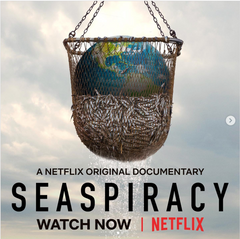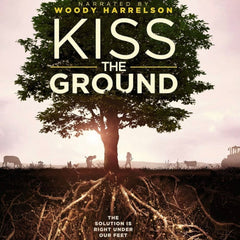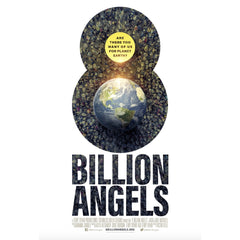Top 5 Must See Eco Documentaries
These are the top 5 must see eco documentaries covering the Land, Ocean, Air, People and Animals. One of the best ways to be educated or at the very least, have a view on a particular issue is to watch a documentary. We are constantly learning new things about the issues facing the environment and how we need become more eco-conscious and live sustainably in our day-to-day activities. So we have compiled a list of 5 titles we have seen and would like to share with you. As you may already know we split our charitable good causes by Land, Ocean, Air, People and Animals. So to follow suit we have repeated that categorisation in our suggested documentaries. We hope you find them stimulating:
LAND
Did you know that over half the world's most productive soil has disappeared in the last 150 years? With an 8 billion human population combined with cliamte change that's very worrying.
Narrated and featuring Woody Harrelson, Kiss the Ground is an inspiring and groundbreaking film that reveals the first viable solution to our climate crisis. We can rise to accomplish the impossible - by regenerating the world's soils, we can completely and rapidly stabilise Earth's climate, restore lost ecosystems and create abundant food supplies. See it on Amazon Prime
OCEAN

Over 90% of the world's largest fish have been fished out. Over 300,000 dolphins, whales & porpoises are killed by fishing operations per year. This is unsustainable.
Seaspiracy
Seaspiracy is a 2021 documentary film about the environmental impact of fishing directed by and starring Ali Tabrizi, a British filmmaker. The film examines human impacts on marine life and advocates for ending fish consumption.
The film explores environmental issues affecting oceans, including plastic pollution, ghost nets and overfishing, and argues that commercial fisheries are the main driver of marine ecosystem destruction. The film rejects the concept of sustainable fishing and criticises several marine conservation organisations, including the Earth Island Institute and its dolphin safe label and the sustainable seafood certifications of the Marine Stewardship Council. It also criticises efforts by organisations to reduce household plastic, contrasting their impact with that of ghost nets. It accuses these initiatives of being a cover-up for the environmental impact of fishing and corruption in the fishing industry. Seaspiracy concludes by supporting marine reserves and for ending fish consumption.
See the trailer here: https://www.youtube.com/watch?v=1Q5CXN7soQg&t=24s
AIR
When came up with the idea to launch Ateliers Verts, there were a considerable number of high profile pundits who claimed that climate change wasn't happening and releasing co2 into the air had little effect. How the last few years have changed!
Before The Flood paints a vivid picture of the urgency of climate change. It begins with the explanation of the Anthropocene era, marking a period where human activities started to have a significant global impact on Earth’s climate and ecosystems. By setting this premise, it showcases how humans have triggered an environmental catastrophe.
The film’s portrayal of the global impact and consequences of climate change is hard-hitting. It takes us from the melting glaciers of the Arctic to the rising seas threatening the existence of Pacific islands, showcasing the stark and undeniable reality of climate change. Each location visited and story told emphasizes the existential threat that the crisis presents.
What sets “Before the Flood” apart is its ability to communicate the gravity of climate change effectively. Through compelling visuals and expert testimonies, it translates scientific data into a language that resonates with audiences. Its purpose is not to create fear, but to convey the urgency for change, and in this aspect, it succeeds remarkably. See it on Amazon Prime
PEOPLE
It is widely acknowledged that the Earth can only support a maximum of 3.5 billion people- yet here we are at over 8 billion people and on the way to peaking at over 10 billion. As humans live longer than ever we must look at bringing the birth rate down.
Today, humanity’s demand for resources vastly exceeds nature’s ability to supply them. Food, water, climate and extinction emergencies are unfolding before our eyes. 8 Billion Angels tells the truth about the conflict between the size of our global population and the sustainability of our planet. It dispels the misperceptions that technology can save us, that reducing consumption is the answer, and that the blame lies solely in the developing world.
At its core, 8 Billion Angels derives its power from stories because audiences connect more deeply to experiences than data and facts. 8 Billion Angels weaves together the voices of people around the world as they confront the growing impact of overpopulation on their lives and the planet.
With passion, humility, and honesty, experts explain the indisputable connection between our environmental catastrophes, unsustainable population and increasing consumption. The consequences to humanity and the planet are laid bare if we do not quickly and dramatically alter our current population and consumption trajectories. See it on Amazon Prime
ANIMALS
There are plenty of documentaries regarding factory farming and the destruction of ecosystems to graze animals for our consumption. But we couldn't make this list without David Attenborough and to recognise the importance of wild animals on whom we ultimately depend for our survival. (Think bees for pollination!)

Extinction: The Facts
From the BBC 2020: With a million species at risk of extinction, Sir David Attenborough explores how this crisis of biodiversity has consequences for us all, threatening food and water security, undermining our ability to control our climate and even putting us at greater risk of pandemic diseases.
Extinction is now happening up to 100 times faster than the natural evolutionary rate, but the issue is about more than the loss of individual species. Everything in the natural world is connected in networks that support the whole of life on earth, including us, and we are losing many of the benefits that nature provides to us. The loss of insects is threatening the pollination of crops, while the loss of biodiversity in the soil also threatens plants growth. Plants underpin many of the things that we need, and yet one in four is now threatened with extinction.
Last year, a UN report identified the key drivers of biodiversity loss, including overfishing, climate change and pollution. But the single biggest driver of biodiversity loss is the destruction of natural habitats.
Seventy-five per cent of Earth's land surface (where not covered by ice) has been changed by humans, much of it for agriculture, and as consumers we may unwittingly be contributing towards the loss of species through what we buy in the supermarket.
Our destructive relationship with the natural world isn’t just putting the ecosystems that we rely on at risk. Human activities like the trade in animals and the destruction of habitats drive the emergence of diseases.
Disease ecologists believe that if we continue on this pathway, this year’s pandemic will not be a one-off event. Watch it here on BBC iPlayer https://www.bbc.co.uk/iplayer/episode/m000mn4n/extinction-the-facts
(Header Image: courtesy of Tripadvisor.co.uk -Pig Beach located on Big Major Cay is a beach on an uninhabited island located in Exuma, the Bahamas. The island takes its unofficial name from the fact that it is populated by a colony of feral pigs which live on the island. It has become a tourist attraction in modern times. It's a photo which combines, Land, Ocean, Air, People and Animals.)
#MinimiseOurHumanFootprint
©Ateliers Verts Ltd. 2023
Back to: Ateliers Verts® The Magazine
















